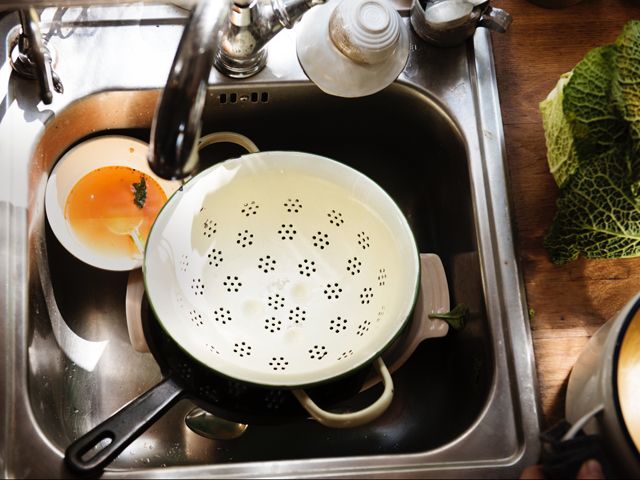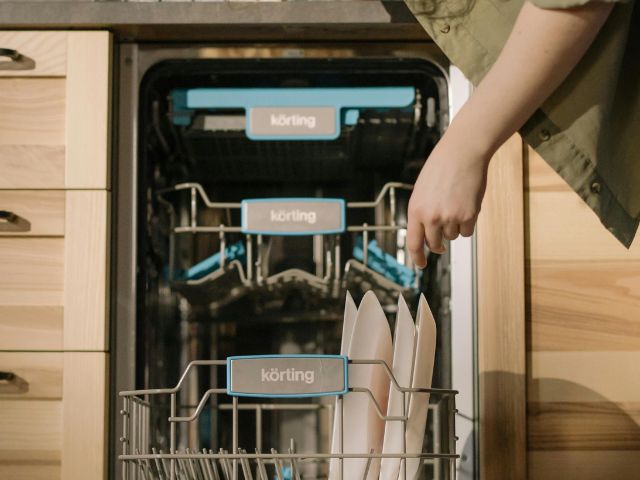
Image Credit: Miele GB
14 dishwasher mistakes to avoid this Christmas
If you’ve ever lived without a dishwasher you’ll know what a total hero the kitchen appliance can be, particularly during the festive season – so long washing up!
In fact a recent survey, of 2,000 adults by Hitachi Capital Consumer Finance, found that 14% of Brits couldn’t cope without their dishwasher and a further one in four of those quizzed in a separate poll by Vileda said they wouldn’t even think of buying a house that didn’t have one.
Aside from saving us hours scrubbing dishes, the humble appliance could also help save us energy and money, which will come as welcome news in these lean cost of living times.
Recent in-depth testing by Which? found that dishwashers are, on average, four times more water efficient than washing by hand per place setting, with the most water-efficient full-sized dishwasher using almost 10 times less water to wash the same amount of dishes as hand washing them.
The consumer champion also estimates that choosing an energy efficient full-sized dishwasher can save you £986 over its lifetime, and be better for the environment.
The trouble is if you’re not using your machine properly it could actually be costing you more in energy bills and we all know what’s happened to those recently.
From not loading it correctly, to wasting time (and water) pre-rinsing, turns out there are some across-the-board errors many of us are making when we’re using the humble appliance.
We spoke to the kitchen experts to find out what we’re doing wrong and how we can put it right to save time, energy and money.

Dishwasher mistakes we’re all making
Not cleaning it regularly
It seems we are a nation of dirty dishwasher users, with a new survey, by AppliancesDirect.co.uk, revealing that alongside ovens, dishwashers are the least-cleaned home devices. On average we’re cleaning them just two to three times a year, but this can lead to a build-up of food, and, in turn, grubby dishes.
“For the dishwasher to perform the best it can, the machine itself requires regular maintenance in the form of cleaning,” explains Ian Palmer-Smith, appliance repair expert at Domestic & General.
The spray arms are the plastic propellers in the machine that push water at high pressure to clean your dishes.
The filter sits at the bottom of the machine and traps food. Ian says the spray arms and the filter are two of the most important elements in your dishwasher.
“If you are finding your dishes are coming out unclean, it could be that the spray arms are blocked with debris and left-over food waste,” he explains.
“The best way to fix this is to empty the dishwasher – including the racks and utensils holders – and then clean the arms using an old toothbrush.”
Another culprit of dirty dishes is a clogged filter with warning signs of this include a bad smell coming from the machine and gurgling noises.
“To fix this, remove the filter and empty any trapped food before scrubbing with a toothbrush,” Ian advises.
“Finally, give it a quick rinse to remove every last bit of dirt and grime.”
Pre-washing the dishes
This is an age-old mistake that many people still make, but there really is no need no rinse off dishes that are going into the dishwasher, no matter how grimy they are.
“There is absolutely no need to waste your time pre-rinsing dishes before stacking them in the dishwasher,” advises cleaning content creator, Laura Mountford, AKA @lauracleanaholic.
“Simply scraping off any uneaten scraps of food into the bin is sufficient so no stray peas or carrots clog up the filter!”
As well as wasting water (according to Finish pre-rinsing dishes before putting them in the dishwasher can waste around 1115 litres of water a year), there’s another reason giving your items a clean pre-loading is a no, no.
“Pre-rinsing dishes will prevent the sensors from working effectively and wastes water, energy, time and money,” Laura adds.

Not loading the dishwasher correctly
If you’re the kind of person who likes to throw everything haphazardly you may want to take a rethink as there is actually a scientific process to stacking the dishwasher correctly.
“The hottest part of the dishwasher is at the bottom as this is where the heating element is so ensure that any plastic items are positioned on the top shelf to prevent them from melting,” explains Laura.
“Mugs and glasses should also go on the top shelf as they are usually designed in a way so that any cups sit to be cleaned as effectively as possible.”
Laura also advises ensuring glasses are not touching each other as this could cause them to crack.
“Larger items such as pots and pans should be placed on the bottom shelf towards the sides and back to prevent them blocking the flow of water,” she continues.
“Any items that are heavily soiled should be placed face down so that the spray arms can clean them with the correct amount of pressure required.”
When it comes to cutlery and utensils Laura says they should be stacked with the handle down so that the dirtiest part can get cleaned properly and ensure that they are not too tightly packed.
“The only exception is knives as the blade should be positioned downwards to prevent any cuts or accidents when unloading,” she adds.
“When loading the dishwasher try to group similar items together as this will make it much quicker when unloading.”
Overloading it
While it is tempting to squeeze as many items in as possible, particularly after the big Christmas dinner, Laura says it is important not to overload your dishwasher as doing this can cause damage to dishes and won’t clean them properly.
“This is because the water and detergent will not be able to flow around the appliance effectively,” she explains.
“Always ensure that the spray arms can spin around freely as anything obstructing them will mean that the cycle does not function properly.”
Unloading it incorrectly
A top tip before unloading the dishwasher is to open the door and place a towel over it for 15 minutes while it cools down.
“This will stop the items being wet before unloading as it will soak up all the steam,” Laura advises.
The way that you unload your dishwasher will also determine how quickly and easily it is to put away the items.
“Unload starting with the bottom rack first to keep everything as dry as possible,” Laura adds. “Focus on one type of item at a time to stack items away efficiently.
So grab all the dinner plates first, then side plates, then bowls and then larger dishes,” she adds.

Not using the correct detergents
Using quality dishwasher detergents is essential for ensuring that your dishwasher cleans effectivel
“I have tried and tested many different types over the years, and I love the Fairy Platinum plus dishwasher tablets as they work effectively even on a short cycle,” Laura explains.
“This means that you save energy and money because you don’t have to run a long hot cycle even when cleaning dirty pots and pans with burnt food on.”
Laura says using a quality dishwasher tablet means that you don’t have to pre-soak burnt dishes with grease or grime on, saving you time.
While tablets are the most common type of dishwasher detergent, Brian Johnson, appliance expert at MyJobQuote.co.uk says it is a mistake to believe this is always the best option.
“For shorter cycles, it can be better to use a loose powder or liquid as tablets don’t always dissolve properly,” he explains.
“Dishwasher liquids and gels are best used on cycles that don’t have a pre-wash as they can leak out before the main cycle begins – meaning your dishes don’t come out completely clean.”
Using it for the wrong items
Most items can be cleaned in the dishwasher and you can even use your dishwasher as a convenient way to clean items that you might not have thought of like oven racks or children’s toys.
“Kitchen items are usually marked whether they are dishwasher safe or not but it is always best to check with the manufacturer,” Laura advises.
“Wooden chopping boards and spoons should not be put in the dishwasher as this will cause the wood to warp and damage.
“Any items that are aluminium, copper or tin are also not suitable for a dishwasher.”
Brian says there are some other items that aren’t suitable for the dishwasher including sharp knives, which can blunt.
“Items like graters have a lot of nooks and crannies, so they don’t always clean well in a dishwasher,” he adds.
“The hot temperatures inside a dishwasher can also ruin the vacuum seal on flasks and break down non-stick coatings on pans.
So, always check items are dishwasher safe rather than assuming they are.”

Forgoing eco mode
Many of us switch onto auto-pilot when popping on the dishwasher.
“We’ve all got our favourite programmes and settings and more often than not, we press those buttons time and time again instead of considering whether the cycle is actually the best one for our dirty dishes,” explains Sophie Lane, product training manager at Miele GB.
“The benefit of using the eco setting is that it uses less water and less energy to do a wash, which conserves resources while cutting back on the bills,” she continues.
A normal dishwasher setting is usually around 55ºC-65ºC, but the lower temperature of eco could generally use around 20% to 40% less energy (and ultimately help you save on cash), Which? reportedly found.
If you don’t have the nifty button on yours, it could be worth considering investing in one that does.
Sophie believes many people don’t use the eco setting as they believe they’re getting an inferior wash with not-so-great results, but that’s simply not the case.
The trade-off, she says, is that these cycles will take longer, as the water doesn’t get so hot as on a standard setting so it takes more time to achieve the same exceptional level of cleaning.
“So yes, if you’re in a hurry then the eco mode is not the one but next time, when it’s less of an issue how long it takes, hit the eco button instead.”
Underloading your dishwasher
It can be tempting to run a dishwasher cycle with just a few items to save time and clear clutter from your kitchen but underloading is a very inefficient way to use your appliance.
“Dishwashers are designed to clean a full load using minimal water and energy, so running yours half-empty results in wasted resources that could’ve been used to clean more items,” advises Dmitry Letsman, dishwasher category lead at Hotpoint.
He recommends waiting until you have a full load before running your dishwasher.
“This helps to ensure that your cycle is as energy-efficient as possible.
Additionally, when items move around too much during the cycle, it increases the risk of breakages or dishes coming out less clean than expected,” he adds.

Not using dishwasher salt
While you may think you can skip it, dishwasher salt is an essential part of keeping your appliance running properly.
“It softens the water, preventing limescale build-up on the heating element and other internal components,” explains Dmitry.
“Without dishwasher salt your machine becomes less effective and can even be damaged long-term.
“Your dishwasher is fitted with a specific compartment for salt and cleaner, and I recommend checking and refilling the salt reservoir regularly to keep things running properly.”
It’s also easy to ignore those warnings on your machine telling you to top up the rinse aid, and if you use a combined detergent, you may be fooled into thinking they’re unnecessary.
But rinse aid serves an important function reducing drying times and water spots and should be topped up before use.
“If your detergent already has a rinse aid added, you may need to adjust the amount of rinse aid your machine dispenses,” advises Brian.
“Typically, if there’s streaking on your dishes, you can reduce the amount of rinse aid but if you see water marks, increase it. Your manual will tell you how to do this.”
Closing the door when not in use
It might seem natural to close the dishwasher door after emptying, but this actually traps moisture inside, leading to dampness, mould, and unpleasant odours over time.
To avoid problems with damp and bad smells, Dmitry recommends leaving the door slightly ajar.
“This lets the interior dry properly, preventing moisture from building up and helping stop mould and mildew from forming,” he explains.
“This simple habit will keep your dishwasher fresher and more hygienic in the long run.”
Not cleaning out the filter regularly
A clean dishwasher filter is essential to your dishwasher’s performance.
It helps keep your dishes clean and ensures that the machine doesn’t break down.
Dmitry recommends cleaning your dishwasher filter every three months, to ensure top performance.
“There may be a few signs which showcase that your filter is clogged including food left on dishes after the cycle has been completed, standing water at the bottom of the dishwasher and unpleasant smells,” he explains.
“The filter is normally located underneath the lower rack in your dishwasher. To access it you’ll need to remove the lower rack.
“Once you’ve removed your filter, the next step is to remove any debris that may have built up in the bottom of your dishwasher, as well as on top of the filter.
“Run water over the whole surface of the filter and watch for any debris that comes loose.
“You may have to rinse it several times to clear all of the debris.”

Not descaling regularly
Glasses coming out cloudy? This usually happens when your appliance hasn’t been descaled or you live in an area with hard water.
“Hard water deposits – including calcium and magnesium – can stick to your glassware – causing the fogging of the surface and unsightly watermarks – even when they’ve had a thorough cleaning,” Dmitry explains.
Detergent residue is another factor that can lead to your glasses coming out of the dishwasher with an unattractive cloudy surface.
“Over time, excessive detergent use, soft water and high water temperatures can work together to erode your glasses and leave small irreparable scratches,” Dmitry continues.
“This process is known as ‘etching’, and causes an imperfect finish and a milky surface that can’t be removed.”
To avoid these issues, he recommends descaling your dishwasher regularly.
“Once a month, you should run your empty dishwasher on the hottest cycle,” he advises.
“You could use a shop-bought descaler or alternatively add a sprinkle of baking soda and a cup of white vinegar to the bottom of your dishwasher before running a hot cycle, which will help remove any built-up grime.”
Using too much dishwasher detergent
The more detergent, the cleaner the dishes, right? Er maybe not.
“When it comes to cleaning appliances, less is more when it comes to detergent and dishwashers are no exception to this,” Ian explains.
“If your glasses are coming out of the dishwasher looking murky or cloudy, this is likely the problem.
“Not only does using too much detergent leave excess product on your dishes but also clogs the appliance over time so keep it to a minimum to avoid needing a dishwasher repair.”
Need more kitchen inspiration? Check out How to create a joyful kitchen space with dopamine décor or Essential care for wooden work surfaces.
READ MORE:





